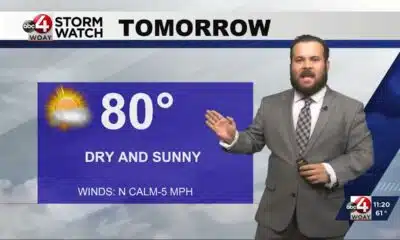News from the South - North Carolina News Feed
Cuts in federal health funding to NC hitting local programs
Two months after sudden cuts to federal public health funding for North Carolina, the impact on local health departments is just beginning to come into focus.
But there’s no time to sit back and assess the damage.
[Subscribe for FREE to Carolina Public Press’ alerts and weekend roundup newsletters]
A slew of separate program eliminations and administrative delays means that even less money is coming to these departments — dismantling programs related to HIV, tobacco cessation and testing well water.
Some in the public health sphere worry that these cuts will make North Carolinians less healthy. Others celebrate the smaller budget and think health efforts are becoming more efficient as a result.
Changes at NC DHHS
The state Department of Health and Human Services lost $230 million in March, forcing the layoff of 80 employees and elimination of dozens of contractors.
Before that, North Carolina already ranked 45th in the nation for per capita public health spending, according to Kelly Kimple, DHHS chief medical officer.
The cuts further impacted the department’s ability to provide immunizations in isolated communities and support to high-risk North Carolinians, including those with behavior or substance-use disorders.
Emergency medical services in Davie, Surrey, Durham, Gaston, Cumberland and Orange counties lost some funding as well.
The leadership team at DHHS now meets daily to discuss the status of expected funds and new federal cuts.
“Our state workforce is incredibly stressed,” Kimple told Carolina Public Press. “It’s like we’re trying to put a puzzle together but we’re missing half the pieces. Reductions disproportionately impact our rural communities that may have less resources available. It’s hard to effectively plan and ensure that we will be able to respond to future challenges.”
In April, Attorney General Jeff Jackson filed a lawsuit against the federal government in an attempt to reinstate the funding.
Congress appropriated these funds, he argued, so the government is required to pay them out.
“The federal government can’t just cancel nearly a quarter billion dollars that have already been congressionally allocated to our state,” Jackson wrote.
“It’s unlawful — and dangerous. That money supports rural hospitals, health care workers, emergency services, and public health programs that protect seniors and families across North Carolina. There are legal ways to improve how tax dollars are used, but this wasn’t one of them. Immediately halting critical health care programs across the state without legal authority isn’t just wrong — it puts lives at risk. That’s why we’re going to court.”
If he wins, North Carolina would once again be able to use the funds the state was allocated in the way Congress appropriated those funds.
The uncertainty and cost cuts at the federal level aren’t the only changes afoot at the department. There’s a new state health director, Lawrence Greenblatt, who started the job in early June.
The proposed NC budget requires DHHS to cut vacant positions, in an attempt to save $10 million per year until 2027.
Meanwhile, funding from other channels isn’t coming down in the way DHHS has come to expect, according to Kimple. In the weeks since those sudden March cuts, even more employees have had to be furloughed.
HIV, tobacco, and well water cuts
Eleven disease investigators who track HIV cases in Charlotte are being laid off this week, according to Raynard Washington, health director for Mecklenburg County.
The investigators track down newly diagnosed HIV patients to connect them with care and identify potential contacts who may need testing — work seen as critical to disrupting transmission of the virus.
The money for these salaries is in the federal budget through September, but the CDC can’t distribute the funding until it receives further authorization. It doesn’t seem like that’s going to happen anytime soon.
The county can’t guarantee they’ll be reimbursed, so layoffs happen.
“It’s a shame because Congress has appropriated the dollars for the work that we’re doing in our local community to fight HIV, and it seems that there is an administrative deficit that’s causing the delay here,” Raynard told CPP.
“What it means now is I have to make decisions about either taking on financial risk to keep people employed or keep contracts funded — or, as the state advised us, prepared to furlough staff and stop work on contracts.”
In Durham County, the health department is bracing for a 10% reduction in two grants that fund HIV testing in the next fiscal year, as a result of the federal cuts.
Meanwhile, a grant from the Environmental Protection Agency dedicated to testing and treating well water in North Carolina was terminated.
This comes just after Tropical Storm Helene made plain the positive public health impacts of well water testing. Flood waters contaminated wells across Western North Carolina, and publicly funded testing and treatment kept people from getting sick.
Well water testing is still going on in many western counties, thanks to special funding in Helene relief bills, according to Jen Greene, director of App Health Care, which serves Alleghany, Ashe and Watauga counties.
But not so for smoking cessation programs.
In April, the CDC’s tobacco prevention arm was completely eliminated. All staff were laid off. This, predictably, cut off federal funding for North Carolina’s smoking-cessation programs.
Nine state-level tobacco prevention staff members — and more at the county level — were furloughed. Due to the funding cuts, the state has canceled contracts with local health departments for tobacco work.
“We really lost a lot of tobacco expertise with the funding cuts that came from the feds down to the state level,” Greene told CPP.
“One of the most important ways to protect people’s health is to educate them about secondhand smoke. We’re going to be able to continue some youth prevention work into next year, but after that, we have no idea what’s coming next.
“There’s not a clear strategy that allows us to understand what to prepare for.”
This article first appeared on Carolina Public Press and is republished here under a Creative Commons Attribution-NoDerivatives 4.0 International License.
The post Cuts in federal health funding to NC hitting local programs appeared first on carolinapublicpress.org
Note: The following A.I. based commentary is not part of the original article, reproduced above, but is offered in the hopes that it will promote greater media literacy and critical thinking, by making any potential bias more visible to the reader –Staff Editor.
Political Bias Rating: Center-Left
The article presents a viewpoint that is generally supportive of public health funding and critical of recent federal and state budget cuts impacting health programs. The language highlights the negative consequences of these reductions on vulnerable communities and frames legal action by a Democratic state official as a necessary response. While it acknowledges some differing opinions briefly, the overall tone favors government intervention and funding to maintain public health services, aligning with a center-left perspective that values social support programs and government responsibility in health care.
News from the South - North Carolina News Feed
NC Courage wins 2-1 against Angel City FC
SUMMARY: The North Carolina Courage defeated Angel City FC 2-1 in Cary, ending their unbeaten streak. Monaca scored early at the 6th minute, followed by Bull City native Brianna Pinto’s goal at the 18th minute, securing a 2-0 halftime lead. Angel City intensified in the second half, scoring in the 88th minute, but the Courage held firm defensively to claim victory. Pinto expressed pride in the win, emphasizing the team’s unity and playoff ambitions. Nearly 8,000 fans attended. Coverage continues tonight at 11, alongside college football updates, including the Tar Heels vs. Richmond game live from Chapel Hill.
Saturday’s win was crucial for the Courage as the regular season starts to wind down.
https://abc11.com/post/north-carolina-courage-wins-2-1-angel-city-fc/17810234/
Download: https://abc11.com/apps/
Like us on Facebook: https://www.facebook.com/ABC11/
Instagram: https://www.instagram.com/abc11_wtvd/
Threads: https://www.threads.net/@abc11_wtvd
TIKTOK: https://www.tiktok.com/@abc11_eyewitnessnews
News from the South - North Carolina News Feed
Is nail gel actually harmful? It's complicated
SUMMARY: Gel nail polishes were recently banned in the EU due to the chemical TPO, which helps the gel harden under UV light. Concerns stem from studies showing potential reproductive risks in rats fed TPO, but humans aren’t exposed this way. The margin of exposure calculated for TPO is very high (1,515), suggesting it’s safe for people. More significant risks come from UV light used to cure nails, which may contribute to skin cancer over time. To stay safe, consider applying sunscreen before your salon visit and discuss toxin-free polish options with your aesthetician. Ultimately, balanced caution is key.
Certain gel nail polishes are no longer widespread in Europe as a chemical was banned due to potential health risks with long-term exposure. But a closer look at the study prompts some questions.
News from the South - North Carolina News Feed
What we know about Charlie Kirk shooting suspect, how he was caught
SUMMARY: Tyler Robinson, 22, from Utah, is in custody as the suspect in the shooting death of conservative activist Charlie Kirk at Utah Valley University. Robinson’s father identified him and convinced him to surrender after family members reported his possible involvement and negative comments about Kirk. Authorities believe Robinson acted alone. Investigators linked Robinson to the crime through Facebook posts and messages retrieved with help from his roommate. Robinson was arrested after fleeing the scene post-shooting. A rifle was found nearby. Charges are expected within three days. Officials praised coordination among police and government agencies in the swift arrest.
Authorities have taken into custody the person they suspect of shooting and killing conservative activist Charlie Kirk on …
-
News from the South - Kentucky News Feed7 days ago
3 states push to put the Ten Commandments back in school – banking on new guidance at the Supreme Court
-
Local News7 days ago
Duke University pilot project examining pros and cons of using artificial intelligence in college
-
News from the South - West Virginia News Feed6 days ago
Protesters in D.C. flood the streets demanding an end to Trump’s military deployment
-
News from the South - Virginia News Feed6 days ago
On the record: Winsome Earle-Sears
-
News from the South - Missouri News Feed6 days ago
1587 Prime gives first look at food, cocktail menu ahead of grand opening in KC
-
Mississippi News Video6 days ago
Interview: Come see Baptist at WTVA Senior Health Fair
-
News from the South - Arkansas News Feed6 days ago
‘One Pill Can Kill’ program aims to reduce opioid drug overdose
-
News from the South - Alabama News Feed5 days ago
Alabama lawmaker revives bill to allow chaplains in public schools









































